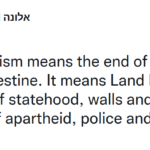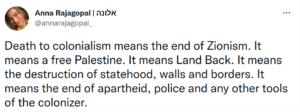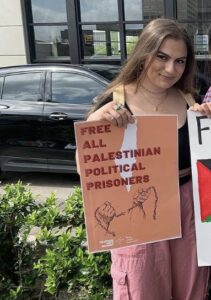Weaponizing Antisemitism “Makes Jews of Color Less Safe”


An example of the comments that got Anna targeted by right-wing group Stop Antisemitism.
A 21 year-old Rice University student and Jew of South Asian ethnicity, Anna Rajagopal was recently hired as a social media consultant for the Jewish social justice organization Avodah. Anna, who uses “they” and “she” pronouns, is also a student activist who co-founded their campus’s chapter of Students for Justice in Palestine. This past Saturday, an organization called Stop Antisemitism posted a hit piece criticizing Anna’s anti-Zionist advocacy and even questioning the sincerity of “her alleged conversion to Judaism.” They urged readers to “email Avodah’s CEO Cheryl Cook and demand Avodah cut ties with this rabid antisemite.” A couple days later, Cook indeed informed Anna that the group was letting them go. I spoke with Anna about what Judaism and anti-Zionism mean to them, what it’s like being a Jew of color, and how this controversy has been affecting them. -DF

Anna Rajagopal
Anna, why did you convert to Judaism, and what was the conversion process like?
Sure. So, I’m not entirely sure why my conversion is necessarily relevant to the smear campaign, other than the anti-convert sentiment that Stop Antisemitism and other Zionists pundits have expressed. But I converted when I was a preteen, when I was a child, and I’ve talked about this numerous occasions across my social media platforms because I’m very open and very honest about the conversion process, about what it’s like to be a childhood convert, and about what it’s like to be raised in Judaism through conversion. For me, really, it was the age-old, telltale tug of the heart. Judaism spoke to me as a child in ways that nothing else really did, and it seemed to fill a space that was missing or a hole that was missing in my life in a way that it continues to do so for me and for my family. And so my conversion process was spurred by, really, an introduction to Judaism, by the book All-of-a-Kind Family, which was written in the early 50s, that I picked up from the Dallas Public Library. And I read the book and felt an immediate connection to Judaism and wanted to learn more about it desperately.
And my conversion process was really formative. I mean, obviously it turned me into a Jew, so to speak, although I would contend that all our souls were at Sinai.1 But my conversion process was a formative part of who I am, not just as a Jewish person, but as just a human being in general. It was beautiful. It was meaningful. It shaped me, it shaped my family, it shaped my community. It’s a story that I am proud and happy to relay, because I think that conversion often faces a lot of stigma, and that converts face a lot of stigma. I think that conversion is actually quite beautiful. From the mikvah2 to the beit din3 to consulting with rabbis, I think that the conversion process is something that for me, was arguably one of the most impactful processes that I’ve ever gone through in my life in a positive light.
Is there a connection between your Jewish identity and your broader politics which you describe as decolonial and anti imperialist?
Absolutely. I’m very strongly rooted in the anti-imperialist and decolonialist, anti-Zionist, Jewish movement. I do a lot of work for that movement on campus, through Students for Justice in Palestine Rice, which I helped co-found this past semester. I do a lot of work online for mutual aid and fundraising, and I do a lot of intra-community and inter-community work between Jewish folks and our Palestinian comrades. I would say that being Jewish has definitely influenced that aspect of my identity. Because the reality is Zionism has tried to make Judaism inexorably tied to the settler colonial movement. And so long as that is the case, it is imperative that every Jewish person, including me, has their Judaism connected to anti-imperialism.
At what point did you feel it was necessary to speak out publicly about Palestine?
I used to be a Zionist. Regretfully so. The result of a decade of indoctrination, I suppose. Like most young Jews, all of my information was coming from propaganda. So another Jewish anti-Zionist, Jew of color friend, sat me down in a facilitated conversation with someone who is now a dear Palestinian friend of mine. And we just talked and I shut up, and I listened and I thought. And I thought, and I thought, and I recognized the patterns of racism that I experienced as a Jew of color within Zionist places and the same racism that Palestinians experience. And I realized that Zionism is not a tenable mode of living. And so after that, I wrote a public apology of atonement for being a Zionist, and I moved forward with anti-Zionism as a driving force in my work as someone who is also South Asian and Jewish.
Have you been to Palestine?
I have not, and I don’t plan to go to Palestine until Palestine is liberated.
What is Avodah and why did you choose to work with them?
Avodah is a Jewish non-for-profit that specifically works through the Jewish National Corps Service, which essentially takes young Jewish students and recent grads from ages of 21 to 26, puts them in select cities such as New York, Chicago, San Diego and New Orleans, and engages them in service work in local communities in order to give back in what I assume is form of tikkun olam4 or social change. I chose to work with Avodah because I am deeply rooted and deeply engaged with Judaism and with a sense of tikkun olam in my own practices of Judaism. Initially, I felt that Avodah embodied that, and I was recommended to the position by several Jewish professionals, Jew of color professionals, because my specialty is social media engagement, social media marketing and digital literacy. And I am a Jew of color, so I’m engaged with that community directly because it is my community. This role of social media assistant through recruitment and racial justice was seemingly the perfect position for me. I applied and was told I was overqualified. I was told that I was so overqualified that they were going to raise my pay from $22 to the $23 and was told that my references were immaculate. I chose to apply and be a part of that position because ultimately I wanted to make spaces for Jews of color. A lot of my work was going to focus and began to focus on the Jews of Color Bayit5 program which is a branch of the National Jewish Service Corps but specifically aimed to make Jews of color feel safe.
My specialty was supposed to be marketing for the JOC Bayit and making Avodah’s social media recruitment more inclusive and more diverse because it is overwhelmingly white and that was my job as one of the only Jews of color on staff, which was a daunting thing to do but I felt I could take it on because again I am and was overqualified. That’s why I chose to do it to create space for people like me who have been alienated by racism in Jewish spaces since we began. I hoped that I could do that and that was my goal.
So how did it feel when Stop Antisemitism began smearing you?
It felt horrific. This is not the first time they began smearing me. They began smearing me last August as well when I received another opportunity. I was granted transfer to Rice University which is a prestigious research institute in Houston. I transferred there from a rural college and as soon as Stop Antisemitism found out about that opportunity that was put forth for me, they attempted a smear campaign. That didn’t result in anything because I am a 4.0 GPA student, [on the] Dean’s List, President’s List. I’m going to toot my own horn. I’m a great student. They couldn’t do anything about it.
The second round was shocking, I suppose. I’m a 21 year old college student from Texas. Why are grown adults, who pay mortgages and have to feed their kids, trying to smear me with racism and misogyny and transphobia and other vitriol? It felt horrific. Because not only did the Stop Antisemitism campaign itself result in direct harassment from them, but it resulted in numerous articles being written about me, engaging in character assassination, racist character assassination. It resulted in highly sexual, inappropriate emails being written to my parents at their place of work, because Stop Antisemitism linked to my parents’ information at their place of work. It resulted in the violation of my privacy, as my conversion statement from 2011, 2012, when I was a child, was dug up by these harassers and has been used as fuel for, again, this anti-convert racist harassment.
And, yeah, it’s been horrific. I’ve been physically ill for the last 72 hours. Vomiting nonstop, unable to drive, unable to move, busy. It’s caused an inordinate amount of physical trauma as well as emotional trauma for myself and my family.
What did Avodah say to you when they fired you?
I got an out-of-the-blue phone call on Monday at the end of my work day. It was Rachel Glicksman with Avodah, and she said, I need five minutes of your time. It was from an unknown New York number. I said, “I’m so sorry. Did I miss a meeting?” And she said, “No, no, don’t worry. The CEO, Cheryl Cook, would like to speak with you. This will only take five minutes.” Cheryl Cook got on the phone and immediately said, “Anna, we’re going to have to let you go.” I said, “Why are you letting me go?” And she said, “Because you incite violence on Twitter in a way that is antithetical to Avodah’s mission statement.” And of course, I responded to that with a reasonable amount of questioning and confusion because I’m very aware that this is the result of a racist targeted harassment campaign.
I remember when the same group, Stop Antisemitism, attacked Rebecca Pierce of the Jews of Color and Sephardic/Mizrahi Caucus. And I’m wondering how widespread you say is Zionists’ harassment of Jews of color.
I would say that it is incredibly widespread because Zionism is a form of ethno-nationalist, white supremacist genocide. It’s a colonial ideology. And Jews of color, while we do retain power over Palestinians unequivocally, don’t fit into the white supremacist idealized version of society. And so, of course, the best way to get rid of us is to do this. I think it’s incredibly widespread. They don’t want us in the Jewish community. They don’t want us in any community, period.
You mentioned that you live in Texas, and I’m wondering if your anti-Zionist advocacy connects to decolonial work having to do with where you’re residing.
Specifically, I’m living in Houston, so I’m living on the land of the Karankawa people. It is not my land. I’m a settler here, as are any non-Indigenous people. And so, 100 percent, I think all borders have to go, and Land Back is universal. It doesn’t just remain in Palestine. Every colonized people, every Indigenous people, every people that have suffered at the hands of a colonial entity, deserves their land back and reparations. And so I’ve done organizing here with a Karankawa solidarity movement a little bit. Not as much as I should, granted, but yes, all of our struggles are connected.
You wrote on social media that you felt abandoned by white Jewish leaders who claim to support Jews of color. Could you elaborate?
I think there’s this term that’s cropped up recently, “social justice rabbi.” Essentially, it’s a Jewish leader who purports to stand for, quote, unquote “progressive” or quote, unquote “liberal” values, but doesn’t actually do any material work to face or acknowledge the reality that Jews of color have to go through at the hands of white supremacist violence within our own communities. You can say all day that you’re a progressive Jew on the Internet or that you’re a progressive Jewish professional. But the reality is that if you’re not saying anything to support us, if you’re not risking anything to support us, what are you doing? The majority of people who came forward for me initially were other Jews of color, who then experienced similar harassment to me following their speaking up for me, similar racist harassment. And so I do not feel supported by white Jewish members of the community, by white Jewish professionals, leaders, writers, because they will always prioritize their whiteness before their Jewishness. And until that changes, I’m not going to feel supported. And I doubt any other Jews of color in similar positions to mine will feel supported either.
Has this whole experience affected your sense of being Jewish and your connection to Judaism?
Absolutely. I’d like to sit here and say, “No, I feel more Jewish than ever.” But if hundreds of thousands of people are telling you that you’re not a real Jew or calling you racist names or saying horrifically misogynistic and sexual things to you, are using antisemitism as a weapon against you—I’m being called a kapo. It’s detrimental to my mental health, my well-being, my spirituality as a Jewish person. I cried and I cried and I cried. And I wondered, what was the point of going forward in any institutional Jewish organization or community network if this was going to be the reality for me and for the people who are like me. And it’s been really difficult. I’ve been grappling with my spirituality. I’ve been grappling with my identity. The reality is I’m Jewish, and that’s never going to change. But my faith and my belief and myself are, of course, going to be under scrutiny right now by my own brain because this vitriol is impossible to navigate.
And at a time when real antisemitism has been very violent, very present, in the past few years, this kind of weaponization of the term really cheapens it and makes Jews less safe, wouldn’t you say?
Not only does it make Jews less safe, but it makes Jews of color less safe because we experience both racism and antisemitism at the same time. Neo-Nazis came to my campus in 2020, and I was terrified because I was the president of the Jewish Students Association at my campus. But when you’re experiencing neo-Nazi violence, and then you turn around and your own community’s calling you an antisemite, who do you have to go to? When you’re experiencing racism and antisemitism at the same time, from warring sides, whose team are you on and who’s on your team? It puts Jews of color in an infinite amount of danger, because we experience two forms of violence, both that intersect and overlap. And it’s a shame that the white Jewish community has allowed this to be the reality for us.
What can folks do to support you right now?
That’s a really good question. I would say continue to amplify any media that I endorse on my Twitter or on my Instagram. I would say email Avodah, and communicate to them in a professional and respectful manner that this is not okay and that this is antithetical to tikkun olam and to their own mission statement. Continue to support Jews of color materially. That means with funds, that means with housing, that means with transportation. Give us resources. Words are cheap, especially when they’re in private. DMing saying that you’re standing in solidarity with me means nothing when you have your whiteness to protect you online. You should be the shield right now, not me. I think that those are steps that white Jews can take to ensure that our protection is made.
1 Jewish tradition says the souls of future Jews, including converts, were present for the mass revelation at Mount Sinai.
2 A ritual bath that people enter when converting to Judaism
3 Rabbinic council that approves conversion
4 Literally: Repair of the world
5 Hebrew for “house”